市场资讯及洞察
%20(1).jpg)
韩国银行(Bank of Korea, BOK)货币政策委员会于2026年1月15日决定:将韩国银行基准利率维持在2.50%,并在同一公开材料中载明该决定获得一致通过。韩国银行在决议公告中同时表示:鉴于通胀预计将逐步稳定、经济增长持续改善、且金融稳定风险仍然存在,委员会判断在评估国内外政策环境变化的同时,维持当前利率水平是适当的。
BOK对主要经济体的外部环境进一步给出方向性描述:BOK认为美国经济预计将维持稳健增长,并将支撑因素描述为人工智能领域投资增加以及减税政策;同时提到关税影响较最初预期更不显著。BOK还表示欧元区预计将呈现较为有利的增长趋势,影响因素包括财政支出扩张与相对宽松的金融条件。对中国,BOK表示由于出口转弱,中国经济预计将较上年放缓,但在提振内需措施支撑下,放缓速度可能相对温和。
在全球金融市场方面,BOK提到,主要经济体对进一步降息的预期走弱叠加对财政稳健性的担忧,推动长期政府债券收益率上升。BOK同时描述美元汇率阶段性走弱后又转强,影响因素包括好于预期的美国经济指标以及股市风险偏好变化;股票价格则在对企业盈利改善预期的带动下继续上行。BOK指出,尽管美国关税政策对全球经济造成影响,全球经济仍预计将维持温和增长。BOK同时将支撑因素表述为主要经济体的扩张性财政政策以及持续的人工智能相关投资。
在国内经济部分,BOK指出,尽管建筑投资仍显疲弱,韩国经济增长仍延续改善趋势,支撑因素包括消费持续恢复以及出口持续增长。BOK提到就业人数总体增加持续,且服务业是重要带动来源。对于前景,BOK表示在半导体行业强劲表现支撑下,出口预计仍将保持有利;国内需求也预计将延续改善趋势,其支撑因素包括消费持续恢复以及建筑投资疲弱程度缓解。BOK并写明当年增长率预计与11月预测的1.8%大体一致,同时指出与半导体行业上行趋势加速、主要经济体增长好于预期相关的上行风险有所增加。BOK认为第四季度增长较上年第三季度强劲增长所带来的基数效应影响而有所走弱,但总体仍维持“潜在改善趋势”的判断。BOK同时指出复苏呈“K形”特征,即信息技术(IT)部门表现强劲与非IT部门持续疲弱并存,从而在行业之间形成较大差异。
在通胀方面,BOK披露2025年12月消费者价格通胀小幅回落至2.3%,并将其原因描述为农畜水产品价格涨幅放缓,尽管石油产品价格涨幅加快。剔除食品与能源后的核心通胀为2.0%,与前月持平,并指出公众短期通胀预期为2.6%,同样与前月持平。对未来通胀路径,BOK表示在全球油价相对稳定的支撑下,通胀预计将逐步下降至2%水平,但较高的汇率水平可能对通胀形成上行压力。BOK还写明当年总体通胀与核心通胀预计与11月预测大体一致,分别为2.1%与2.0%。
在金融与外汇市场方面,BOK描述韩元兑美元汇率在外汇市场稳定化措施后出现明显下行,但随后又回升至1400韩元中后段区间,并将驱动因素列为美元走强、日元走弱、地缘政治风险上升以及居民持续海外投资等。BOK同时提到,由于市场对降息预期走弱,韩国国债收益率显著上升,但之后有所回落;股市则在对半导体等主要行业盈利改善预期的带动下大幅上涨。BOK在同一段落中提到家庭贷款增速放缓趋势延续,主要与住房相关贷款增幅放缓及其他贷款净偿还有关;同时指出首尔及周边地区房价仍以较快速度上涨。BOK强调需要持续关注外汇与住房市场变化。BOK提到汇率在年末稳定化措施后曾对美元下跌超过40韩元,但本年度又回到1400韩元中后段区间,因此需要高度警惕。BOK将相关背景归因于美元走强、日元走弱以及伊朗与委内瑞拉相关事件引发的地缘政治风险上升等多因素组合,并提到海外投资与外汇供需失衡因素仍在。BOK同时提示需要警惕家庭债务相关风险,并提到首尔房价上涨仍处于高位,且价格外溢效应在部分非监管地区显现。
在政策框架表述方面,BOK表示其将以中期稳定通胀于目标水平为目标开展货币政策,在监测经济增长的同时关注金融稳定。BOK在政策决定中指出,国内经济继续处于改善增长趋势,上行风险有所增加;通胀预计逐步下降,但较高汇率仍是通胀上行风险来源之一;金融稳定风险仍与首尔及周边房价、家庭债务以及汇率波动加剧相关。基于这些因素,BOK表示将一边支持经济增长恢复,一边密切监测国内外政策条件变化及其对通胀与金融稳定的影响,并据此作出政策决定。
此外,BOK在开场陈述中还披露了与货币政策决定同日的另一项决定:BOK决定将针对低信用个体工商户与中小企业的临时特别支持项目延长六个月,并说明该决定考虑了尽管经济增长持续改善,但中小企业与地区经济复苏仍相对滞后的情况。
相关官方文件和详细数据请参考:
韩国银行官方网站:https://www.bok.or.kr/eng/main/main.do
BOK 2026年1月15日《货币政策决定 + 行长开场陈述》:
https://www.bok.or.kr/eng/bbs/E0000634/view.do?nttId=10095713&menuNo=400423&relate=Y&depth=400423&programType=newsDataEng
BOK 2026年1月15日《通货政策方向/决议文》:
https://www.bok.or.kr/portal/bbs/P0000559/view.do?nttId=10095711&menuNo=200690
BOK 2025年11月《经济展望(Economic Outlook)》:
https://www.bok.or.kr/eng/bbs/E0000634/view.do?nttId=10094798&menuNo=400069
韩国统计局(Statistics Korea, KOSIS):https://kostat.go.kr/anse/
免责声明:本文内容仅为一般性建议,未考虑任何个人的具体投资目标、财务状况或特定需求,不构成任何形式的个人财务建议、投资建议、税务建议、法律建议或任何金融产品推荐等。本文陈述的信息基于韩国银行(BOK)等公开渠道资料。本文可能包含对市场机制与潜在情景的讨论,但不构成对未来市场走向、经济表现、投资回报或政策变化的承诺或保证。过往表现和历史数据不代表未来结果。所有投资均涉及风险,包括可能损失全部本金,外汇、差价合约(CFD)、衍生品等杠杆类产品具有高风险特性,可能导致快速且重大的损失,市场价格可能因各种因素剧烈波动。本文引用的信息来源于公开渠道,虽已尽力确保准确性,但不对信息的完全准确性、完整性、及时性或适用性作出任何明示或暗示的保证,信息可能存在延迟、需要更正,或因市场和政策环境快速变化而不再适用于当前情况。在做出任何投资或财务决策前,您应当仔细考虑自身的财务状况、投资目标和风险承受能力,进行适当性评估以确保相关产品或策略符合您的需求,并咨询持有澳大利亚金融服务牌照(AFSL)的财务顾问、税务专业人士或法律顾问,同时了解并遵守您所在司法管辖区的相关法律法规。本文提及的任何第三方机构、产品或服务不构成推荐或认可,相关商标、名称归其合法所有者。在法律允许的最大范围内,作者及相关方对因使用、依赖或无法使用本文信息而导致的任何直接、间接、附带、特殊或后果性损失不承担任何责任。投资有风险,决策需谨慎。
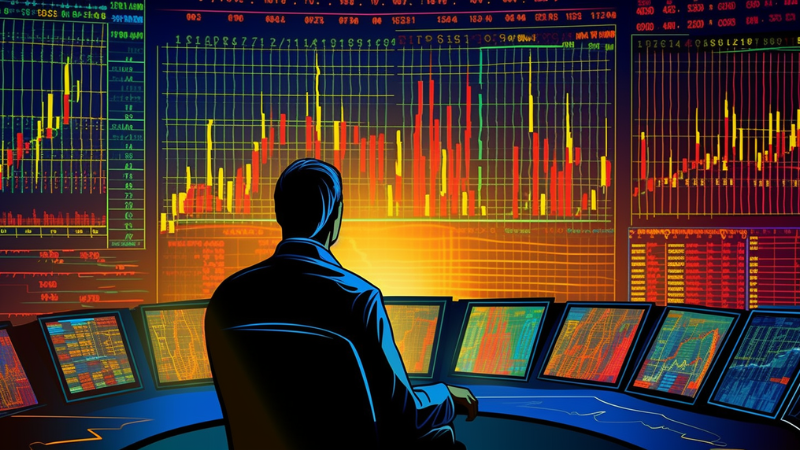

热门话题
资本过山车,惊心动魄,各种闪崩再现。
先看澳洲,澳联储官员说圣诞节之前不会降息,我认为这是比较合理的。因为圣诞节是消费旺季,通胀在这个时候可能会小幅度上升,所以圣诞节之后降息,能够缓解通胀压力对于降息行为的冲击。所以,在圣诞节之前,我认为澳元大概率还会上涨一次,澳元兑人民币可能会重新回到4.75上方,这对目前的价格来说,前景不错。
需要换汇的朋友,或者所著锁住汇率波动的投资者,以及希望能够在澳元价值回升过程中获利的投机者,这三个月都是比较不错的机会,毕竟央行在兜底,澳洲大概率在美国降息之后再降息,逻辑上澳元反弹是大概率事件。
本次市场下跌最早的迹象出现于USDCHF这个产品,以及AUDJPY也产生了预警。为什么呢?因为瑞士法郎和日元有避险作用,它们的避险体现在Oled money那里,所以我们普通投资者不会通过这两个货币区去避险,而CHF瑞士法郎避险,主要对索罗斯,罗斯柴尔德这类欧洲老钱有需求,他们的诉求是,保持资产的实际购买力不变。所以,我们追求的是增值,大幅度增值,他们追求的是,是国际社会中的购买力保值,并不是在某一个国家和地区的相对保值。所以,CHF的异动,从一周前就开始发生了。
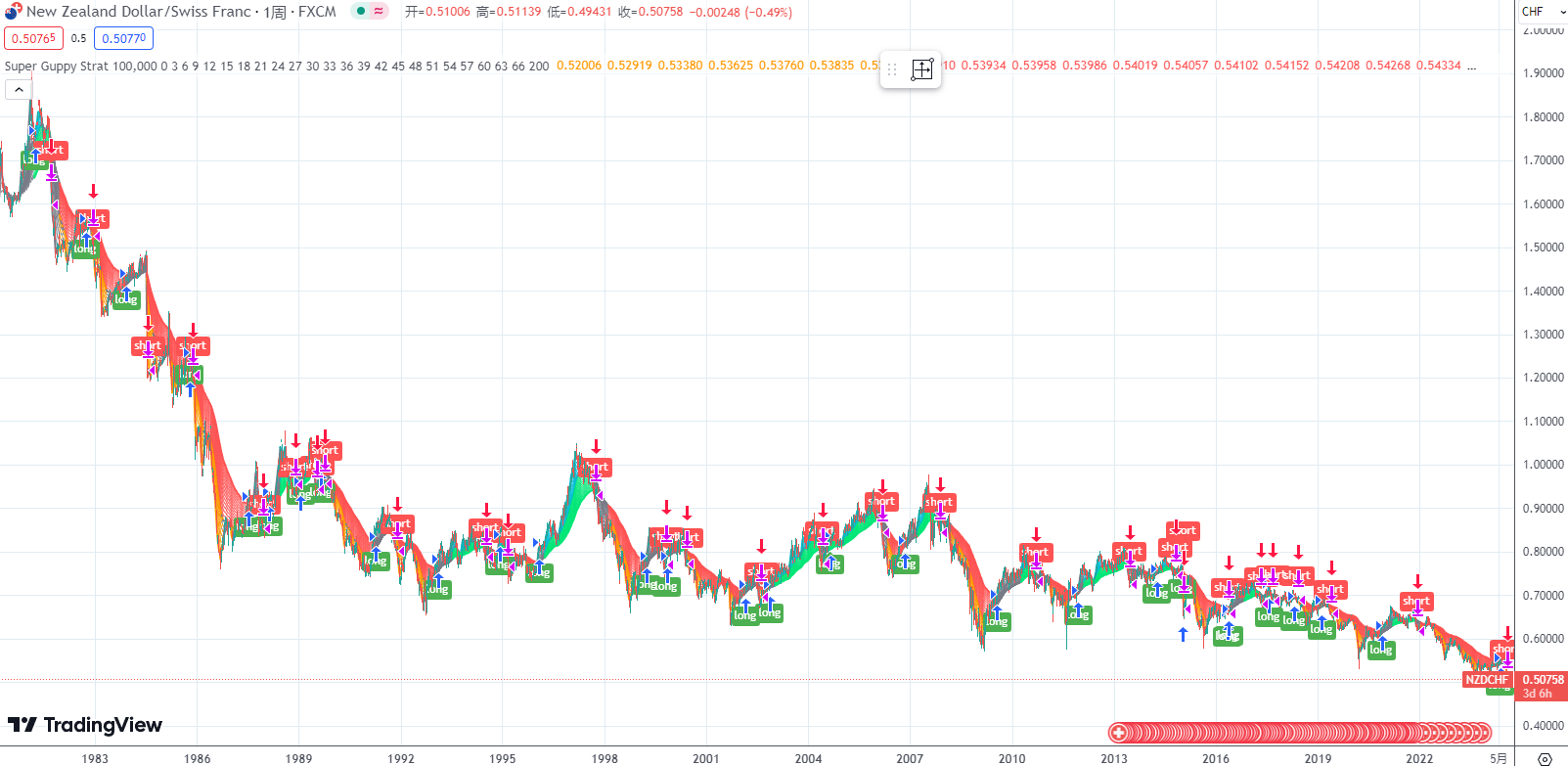
这幅图是NZDCHF这个产品,从1980年的最高点2的汇率,跌到现在0.5,新西兰的实际购买力下降了75%。所以,如果欧洲的老钱,在1980年就很有的人,把钱换成了瑞士法郎,那么当时的100万瑞士法郎,只能换50万,到现在,可以换200万,相当于涨了4被倍购买力。这就是为什么,old money喜欢买入CHF的原因。对于AUDCHF,则更惨。澳元兑瑞士法郎在1980年,是2.5,目前只有0.55,跌幅比NZDCHF还要大,超过了75%。所以,对于百年以上的资本,他们更看重的,是长期的国际购买力保值。
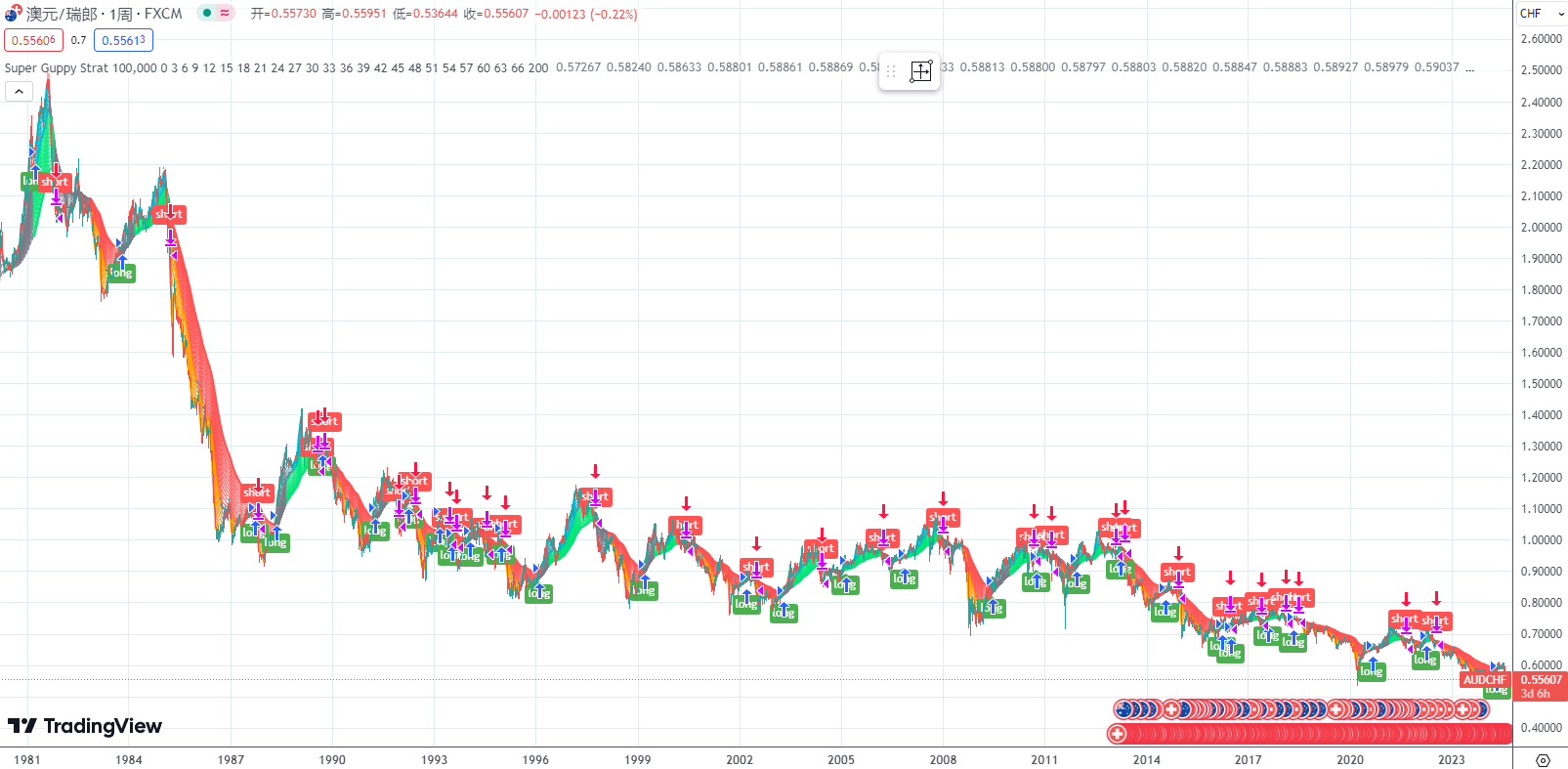
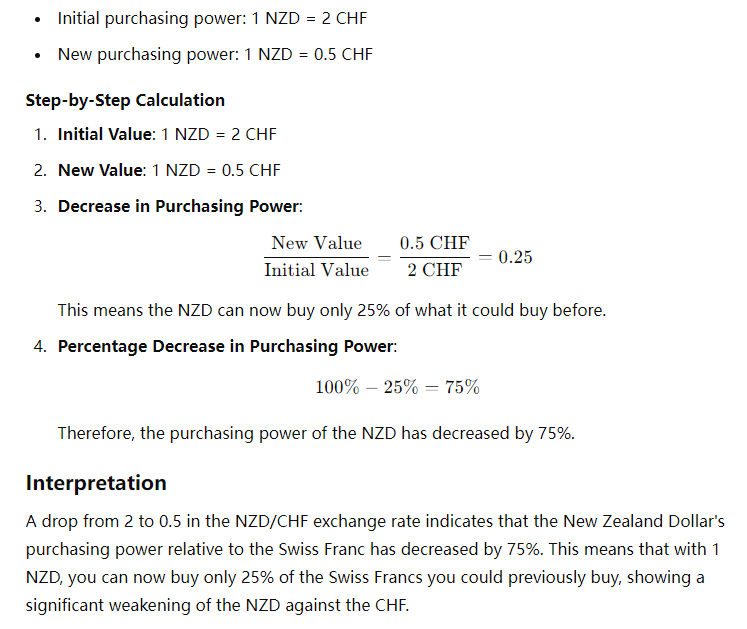
根据Chatgpt简单的计算,澳元国际购买力下降了75%。那么为什么说一周前市场就出现了异动呢?是因为AUDCHF这类产品,从7.15日就开始下跌了,并且在8.1日之前,下跌幅度已经超过了5%,这对于货币对是比较少见的。
因此,这一次下跌,市场恐慌,我认为背后的推手,是欧洲的国际资本为主,他们在全球布局,以轻资产+杠杆的形式,游走于股市,汇市和债市,他们的出售手,往往伴随着,快速的波动,股汇债同时震动。不了解他们操作模式的朋友,可以看一下之前索罗斯的很多战绩。

还有一个因素可以验证这一逻辑,就是美国股市并没有太大波动,我认为这种波动幅度是相对正常且合理的,毕竟之前涨了老多老多倍,还不如人家回调么。加速回调,是一种智慧,能够快速释放紧张情绪,并且压缩降息来临可能造成的资产价格继续走向泡沫的概率。而美盘的时候,美国资本相对比较淡定,通过各类金融工具,做空保护,但是并没有继续空欢喜恐慌性砸盘,大部分的下跌,产生在澳洲时间段,也就是亚洲盘。
所以,抛售美国股票的,可能是因为日本央行加息准备撤退回到日本的国际资本和日本财团,他们要抓紧换日元,还钱去。所以,最近日元涨幅很大,很快,因为满了慢了,就会拜拜白白损失好多好多钱,他们跟日本银行借的,可不是几个亿这种,而是填很多很多零。所以,预期变了,风险结构变了,对于套息的资金和欧洲老钱们,他们的投资逻辑快速转变,造成了这次恐慌。因为他们的资金,需要真实在银行成交,而他们的量,是完全可以影响市场的,银行收到指令换汇,是必须要在指定时间换完的,所以,巨大的波动就演变成连锁反应。但是,我不认为这是坏事情,因为很多资产,不敢买,但是,现在给了机会,最简单的就是,澳元兑人民币,4.6附近和以下的位置,长期看,就是财富大礼包。祝愿大家投资顺利。
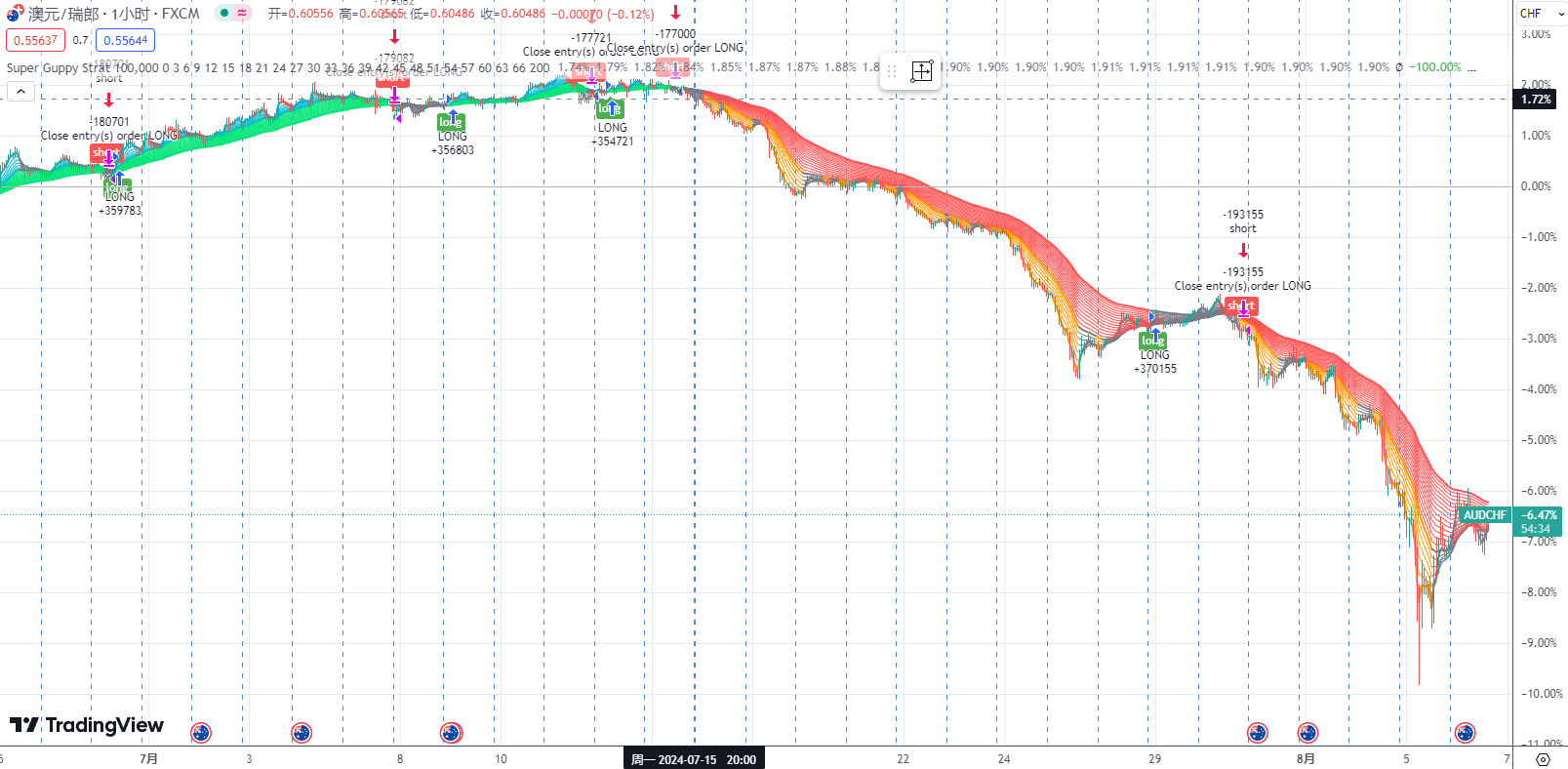
免责声明:GO Markets 分析师或外部发言人提供的信息基于其独立分析或个人经验。所表达的观点或交易风格仅代表其个人;并不代表 GO Markets 的观点或立场。联系方式:墨尔本 03 8658 0603悉尼 02 9188 0418中国地区(中文) 400 120 8537中国地区(英文) +248 4 671 903作者:
Jacky Wang | GO Markets 亚洲投研部主管
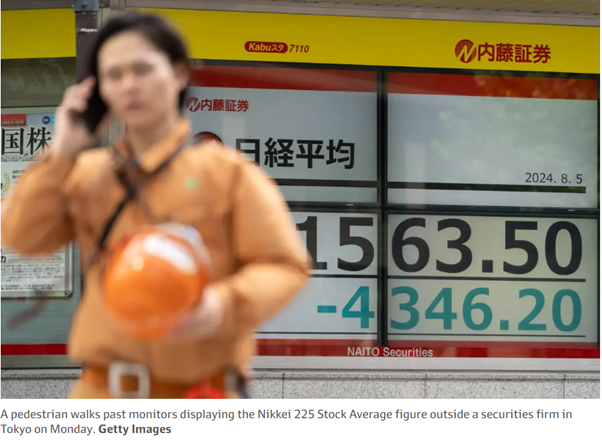

热门话题
昨天才刚刚是周一,但是澳洲的股市几乎已经要疯了。说实话,周一通常大家都比较忙,我一顿瞎忙直接忽略看市场,直到下午同事过来和我说,日本熔断了,我还很惊讶?难道日本又地震了?还是出意外了?一问,没有天灾,也没有意外,就是纯纯的一个暴跌。很单纯,不靠灾难,不靠意外。日经指数暴跌12.4%,直接触发熔断保护机制。澳洲股市从上周五到本周一两天一共下跌6%,创下2020年疫情结束以后最大2天下跌记录。美股在昨晚肯定日子也不会好过到哪里去?

那这到底是什么原因导致了这大规模的下跌呢?总结来说就是两个原因:这个原因,和那个原因。开个玩笑。其实现在说原因,都是马后炮。但是我们还是要简单装模做样分析一下的,毕竟世界各国各大银行证券机构都分析了,咱们也要跟一下的。我简单看了一下,各国媒体给出的原因大概有以下几个:1. 日本央行加息去杠杆,导致日元连续升值,那传统之前在日本借钱,放去美国或其他国家国家存定期买国债,不但赚利息差还能赚日元贬值的钱收益率会大幅下跌,甚至会开始亏。2. 美国股市在过去12个月的疯狂上涨,期间过程里没有有效的回调来释放筹码和压力。导致大家都在大的回调只是一个时间问题。3. 巴菲特在周末公布的最新持仓报告里显示其大量卖出美股股票,换成现金持有,使得很多投资者跟风交易。总结来说,其实这次下跌我认为就是一个正常的获利出逃以后的大回调。我们知道美股在过去10个月已经连续上涨超过30%了。中间仅仅有过1周左右的小回调,但是不论是时间还是幅度,都不能算一个合适的回调。因此上周五发布的美国非农就业数据不理想其实就是一个借口。用这个新闻来炒作美国衰退概念,从而触发出逃和回调。毕竟没有哪个股市可以永远不变一直上涨的。之前上涨的人需要有借口和理由卖出套利。原来没有来得及买入的人需要等待机会可以进场。机构需要话题,市场需要变化,如果这个市场永远就是一个方向上涨,停,再上涨,那就没有新意了。只有出现大回调之后,才能有下一次更高的上涨。就像拳击手一样,一次出拳之后,需要把手收回来,才能有下一次的进攻。
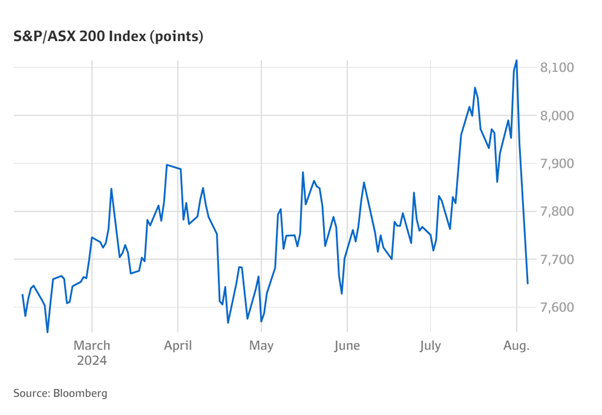
所以,这次的下跌在我看来就如同是长期天晴,好不好?好,长期暴晒会导致土地干旱,河流枯竭,空气干燥,皮肤晒伤。我们需要下雨来调节湿度,需要下雨来滋润土地,需要下雨来降低气温,需要下雨来给心情一些音乐。所以,别怕,跌跌更健康。好了,本篇完。但是篇幅有点短,那只能再加点个人干货:说说暴跌之后意味着什么。我一般不喜欢废话太多,昨天我看了很多英文媒体的文章,不知道他们是不是按照字数支付稿费,反正就是废话多。我喜欢开门见山,简单直接:暴跌之后,美联储要开紧急会议了,大家推测,如果再跌2、3天,美国可能9月会直接加息0.5%。来提振股市和经济信心,因为就周五一个非农就业人数,就突然搞得市场风向马上变了,说美国经济有可能不行了,要衰退了,要这,要那了。往轻了说,这就是纯粹的欲加之罪,何患无辞。这大家等回调等的望穿秋水,好不容易抓到一个坏消息,那不得使劲用。但是另一种阴谋论的说法,就是说过去20年来,每次美联储要降息之前,美股都会很“懂事”的暴跌,要不然,不下跌,留出空间来,怎么能证明美联储降息以后起到了表率作用呢?因此如果9月要降息了,那8月赶紧的表现表现。但是对于咱们澳洲的朋友们来说,日本熔断,澳洲暴跌,其实从另一个方向考虑,并不是坏事。哪个方向呢?—— 从你的房贷月供来考虑。我们知道前几周,澳洲市场都在传言说澳洲物价太贵了,所以还有可能要加息。我已经多次反驳,这基本不可能。澳洲联邦政府都作弊也要降物价了,央行还会这么傻吗?极大概率是不会的。在昨天暴跌之后,ASX的央行降息概率已经从之前的5%可能性提高到了20%,虽然依然概率极低,但是也说明市场判断,股市下跌会加速央行的货币宽松政策到来的时间。
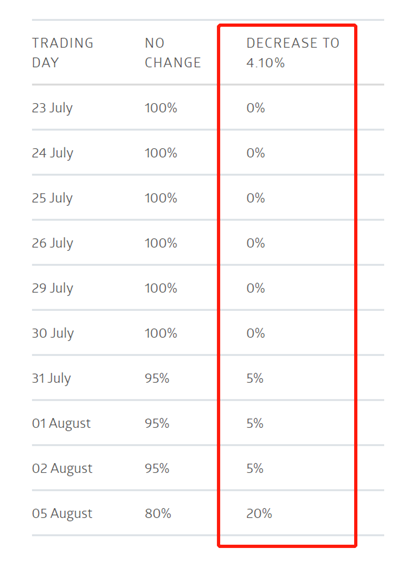
但是经过上周五和昨天这一波下跌,如果本周再来上个几天暴跌,那基本上澳洲是99%不会加息了。毕竟本来澳洲央行还觉得澳洲经济比老美健康多,挺得住再来一次加息。但是如果股市一周暴跌10%,那要是止不住,整个国家的经济都得嗝屁。所以如果把股市暴跌,和物价压不下去来对比重要程度的话。那毫无疑问,澳洲央行会把稳定股市放在压倒性的地位上。而会伤害股市的加息计划,就自然会不再考虑。所以今天咱们话题总结:日本熔断了,澳洲暴跌了,美国也要大回调了。怎么办?不用害怕,这只是一个本应该早就来的回调。只有充分,有效的回调了,才会有更多资金进场,股市才会继续上新高。第二,欧美股市的暴跌,将会再次压低澳洲加息的可能性。如果说本来还有20%可能性会加息的话,现在一暴跌,估计95%肯定不会加息了。其实从澳元债券的收益率,以及澳元和美元的表现来看,市场现在已经觉得,澳洲加息是几乎不可能了,如果下跌继续,那降息将会来的更快。
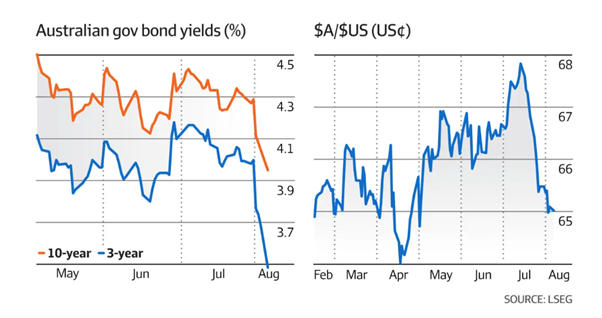
多说一句,一个标准,正常,充分的回调,永远不可能一步到位,一天暴跌就完了。这肯定是一个先暴跌,再反弹,再更多暴跌,如此反复2-3次之后才能充分到位。所以现在市场还在寻找底部,在底部确认之前,大家不要着急。免责声明:GO Markets 分析师或外部发言人提供的信息基于其独立分析或个人经验。所表达的观点或交易风格仅代表其个人;并不代表 GO Markets 的观点或立场。联系方式:墨尔本 03 8658 0603悉尼 02 9188 0418中国地区(中文) 400 120 8537中国地区(英文) +248 4 671 903作者:
Mike Huang | GO Markets 销售总监


热门话题
周五的非农未能挽救持续下跌的美股,同样的现象也将在澳股发生。今年以来每次非农周都是美股大涨周,无论非农数据多高,都未曾拖累股市,要是遇到非农比预期还低,那就业市场适度降温正好能够满足美联储的降息期许,自然也继续助推美股上涨。而这一切在刚刚过去的周五被彻底改变了。让我们解读下其深层原因。

本次非农数值11.4万增幅刷新了过去两年的增幅新低,根据对每个月修正值必下修的规律,下个月给到修正值很可能会接近10万甚至更低,加上美国这几年涌入两千万非法移民,简直人口进入非农统计,非农数据的水分本来就很大,实际美国的就业情况肯定更加低迷,不得不令市场担心这样的一个就业情况是否预示着美国后续的衰退已经很近了。我们知道美联储的两大职责所在,控制通货膨胀,控制失业率。这次的利率决议鲍威尔已经表态通胀并不是美联储仅需要考量的标准,美联储同样需要维持就业市场的稳定。尽管反弹到4.3%的失业率在美国历史上并不算高,但考虑到经济数据的滞后性,美联储不得不尽早做出防范,以免失业率暴涨的刹车届时像控制通胀那样变得十分棘手而难以刹住车。这就造成了非农数据一出来,市场判断美联储9月已经不是降不降息的问题,而是降息多少个基点的问题。甚至有机构还是预测今年美联储将降息三次合计100个基点。
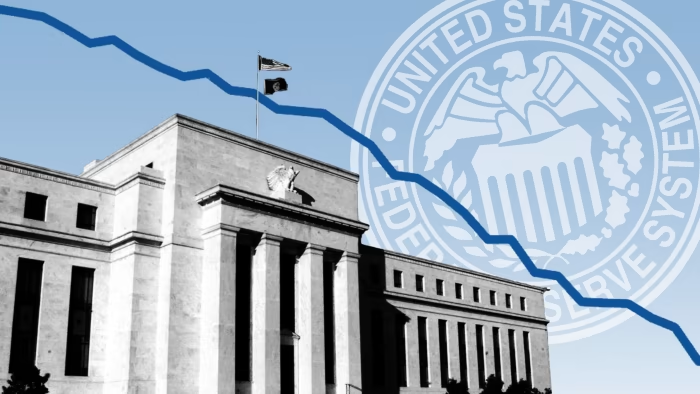
个人觉得降息100个基点在今年是过分激进了,也是没有依据的猜测,美联储降息力度还需要考量首降后经济数据的反应。我们上面提到的非农造成的降息预期在一定程度上是利多股市的,只不过过低的就业数据造成的衰退担忧完全占据了主要层面,进而大大利空了股市。而这个原因也仅仅是停留在表面上的,股市持续下跌的更深层次理由是比较复杂的。另一个市场整体回调的原因是日本的第二次加息,令避险资金的偏好出现了动摇,本在美国国债的避险资金有了趋向日本的苗头,国债收益率开始随着美国降息预期的增加而暴跌,我们可以看到之前曾重点关注过的远期国债标的TLT近几天开始放量大涨。这里更有美元走低的影响,因为特朗普曾在采访时表态美元对日元的离谱上涨给了日本产品特别大的竞争优势,影响了美国本土产品的国际竞争力,他若上任,首先要降低美元对日元的汇率以及美元对人民币的汇率。那次发言后美元对日元的走势几乎就是单边下跌,一路从超过160到目前的跌破150,美元对人民币也从7.2平台跌到了7.1大平台。第三点对股市造成巨大影响的就是美股财报季的放大效果。由于高科技龙头股占股指的权重太高,而市场对这些都高科技巨头的期望值也特别高,就算业绩表现不错,分项细节以及业绩展望等任何部分只要有略微不完美,股价就立马暴跌回敬,这点我们从今年4月份财报季就得到的验证,理由也很简单,2023年高科技龙头股涨了太多,催生出的3万亿美元市值俱乐部就一度有三家,当时微软,苹果和英伟达三驾马车并驾齐驱,离谱的涨幅令当下的获利盘极易因细微原因而止盈避险。
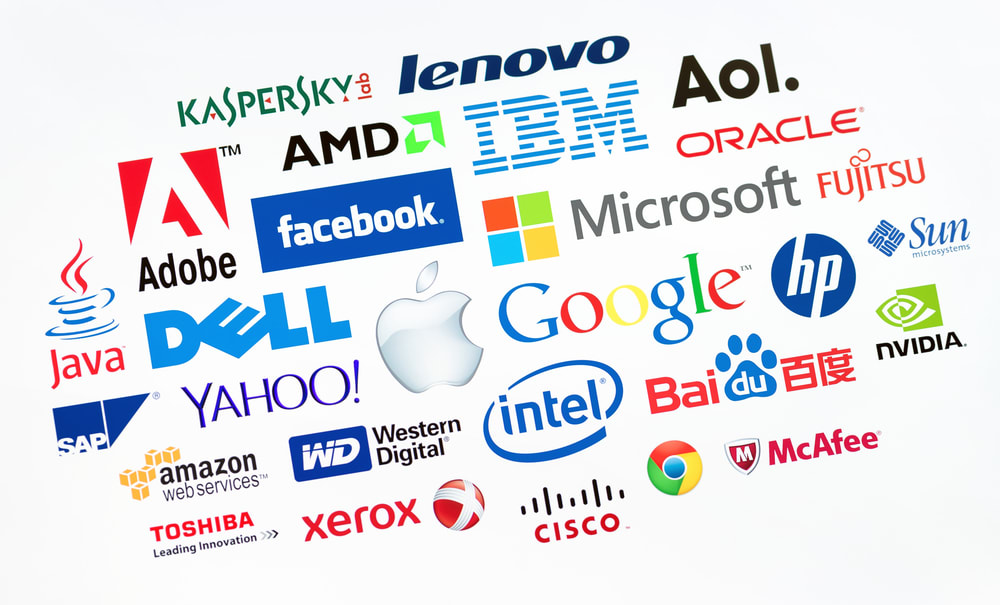
最后一点使得美股继续回撤的原因就是美国进入加息周期后,连续几年的8月9月和10月都是股指艰难时期,股市大幅回调就连续发生在这三个月,从投资者心态上灌输了一种恐慌。而历史上美股下跌最狠的时候,也是每次利率政策转向的时候。越是实体经济遇到的问题,才越逼迫美联储开启降息进程。因此在当前市场预计9月份降息板上钉钉的前提下,8月股市持续回调似乎成了一种默认的情绪化操作。就业数据暴雷,汇市巨震显示出避险资金转向,美股财报季造成的动荡,以及市场情绪上积累的恐慌,合力造成了美股持续下行。从以上综合分析看,新的一周国际金融市场没有重大的足以影响市场走向的消息待公布,那么美股惯性下跌会成为大概率事件,澳股也将跟随下跌。从技术面分析,纳指标普均以及破位转下行趋势,过去四月份的三周回调转反弹现象很难在当前重现,做好仓位保护才是最首要的任务。从中长期看,货币政策转向后极易形成牛市的到来,今年的圣诞行情,或许会比去年更加猛烈,看看伯克希尔刚刚周末公布的现金持有量为2769亿美元就可以看出巴菲特老爷子目前的态度了,大量持有现金避开三季度的波动,等待机会的出现。免责声明:GO Markets 分析师或外部发言人提供的信息基于其独立分析或个人经验。所表达的观点或交易风格仅代表其个人;并不代表 GO Markets 的观点或立场。联系方式:墨尔本 03 8658 0603悉尼 02 9188 0418中国地区(中文) 400 120 8537中国地区(英文) +248 4 671 903作者:Xavier Zhang | GO Markets 高级分析师
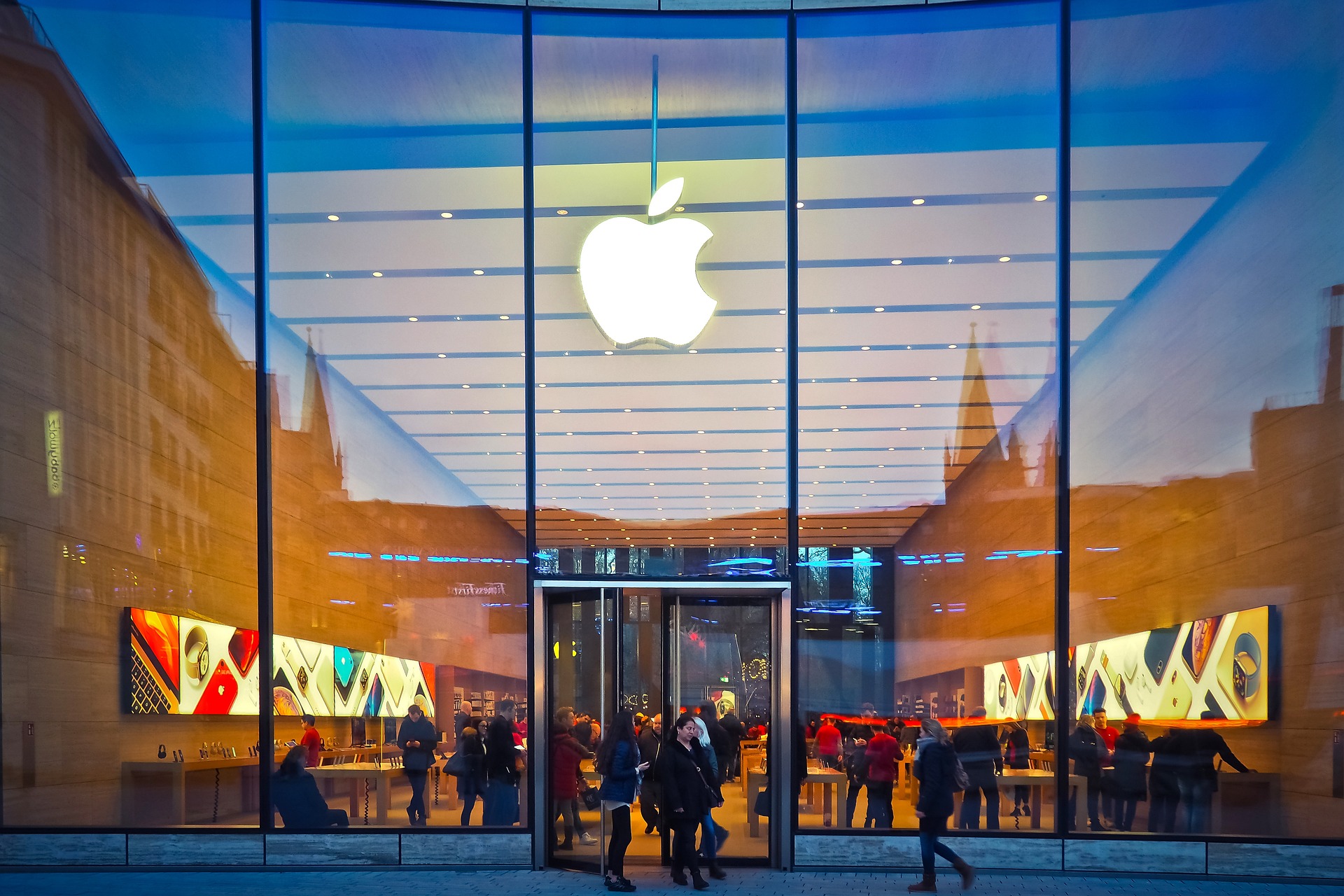

热门话题
苹果公司预计,即将推出的人工智能功能会在未来几年里面让Iphone大放异彩,并帮助公司销售进行复苏,特别是在中国市场。库克,在周四的电话会议上讨论第三季度业绩时表示,这个即将推出的Apple Intelligence功能会让人们有新理由去换新手机。这将是一个关键的升级周期。虽然这样说,但是高昂的售价和真正的实用性也是这个不确定因素。
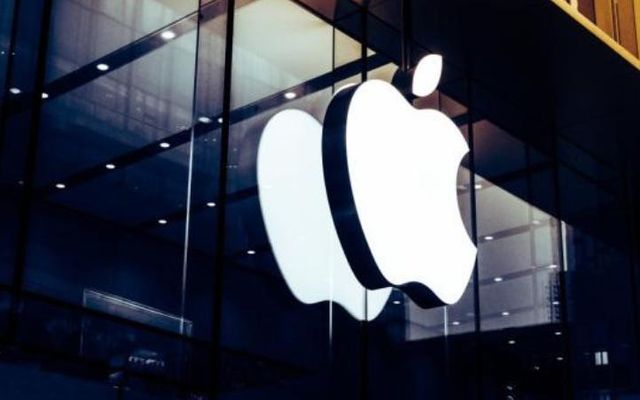
尽管中国市场的销售表现不佳给总体业绩带来了一些阴影。到6月29日为止的这个季度,苹果的收入增长了5%,达到858亿美元,超过了分析师预测的845亿美元。但在中国,销售额下降了6.5%,至147亿美元,低于华尔街预测的153亿美元。尽管如此,苹果的股价在财报发布后的盘后交易中波动,截至纽约时间下午6:30,股价上涨了超过1%。今年到目前为止,苹果的股价已经上涨了13%,投资者希望新的人工智能技术能够推动销售。
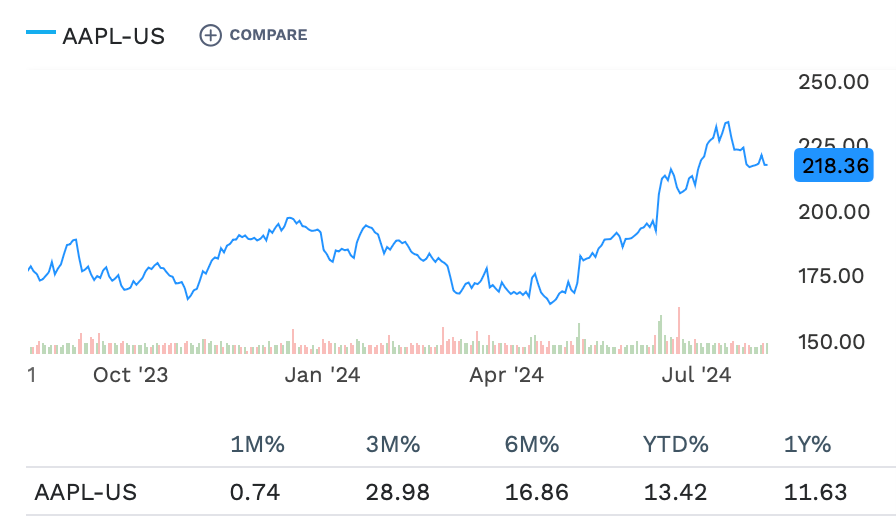
(Source:FactSet)关于中国市场的担忧重新浮出水面,包括正面临越来越激烈的竞争,还有中国的经济增长也在放缓等等。苹果将销售下降主要归咎于美元走强的影响,并表示其在中国的基础业务实际上比以前更健康。三个月前,苹果高管表示,销售放缓更多是由于其他产品销售疲软,而非iPhone表现不佳。苹果预计,9月季度的总销售额将与刚结束的季度持平,增长约5%,而华尔街的预测为4%。高管表示,这段时间的亮点将是服务业务的两位数增长。我们来看看这次财报是什么情况:第三季度每股收益为1.40美元,超过了分析师预期的1.35美元。6月是苹果通常较慢的时期之一,因为许多客户都在等待秋季新iPhone的推出。
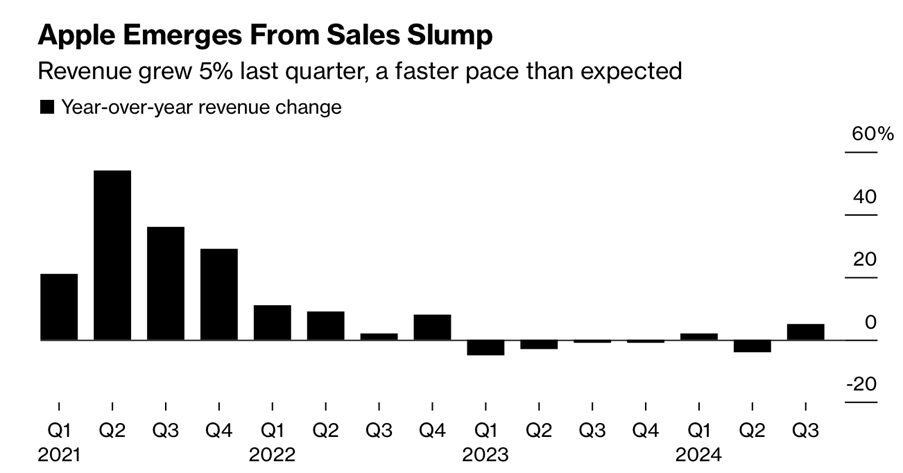
(Source:Bloomberg)苹果的旗舰产品iPhone的销售额为393亿美元。尽管这一数字比去年略有下降,但仍高于华尔街的预期。三个月前,公司没有预测6月期间的iPhone收入,这表明其对动荡的智能手机市场仍有所顾虑。苹果的iPad业务得益于新型号的发布。公司在5月推出了包括配备M4芯片的更昂贵iPad Pro和更快、屏幕更大的iPad Air在内的重大升级产品。位于加州库比蒂诺的公司报告,该类别的收入为71.6亿美元,同比增长24%,超过了66亿美元的预期。苹果之前预计,iPad在6月期间的增长率将达到两位数,这一目标已轻松实现。在过去几个月,一些客户和学校一直在等待新型号的发布,从而推迟了iPad的购买。此外,苹果还在开发配备更快处理器的入门级iPad和iPad mini版本。这些新版本在未来几个月发布时可能会促进更多的升级。

公司还在上季度推出了Apple Intelligence,并在6月的开发者大会上展示了新的AI工具。但这些技术预计在10月之前不会向客户发布。苹果还没有解释如何通过这些功能创收,除了刺激对兼容设备的需求外。包括App Store、Apple Music和TV+流媒体平台在内的服务业务继续成为增长的驱动力。上季度,该业务产生了242亿美元的销售额,同比增长14%。服务收入略低于华尔街的预期240亿美元。不过,该业务正面临来自监管机构的压力,他们正在寻求对App Store进行改变,认为其在行业中具有反竞争性。这最终可能限制苹果从订阅和应用下载中获取收入的能力。Mac收入增长2.5%,达到70.1亿美元,得益于返校购物季的开始。这与华尔街的预测一致。自去年年底以来,苹果还没有对Mac进行重大变动,但在3月为MacBook Air笔记本电脑增加了M3芯片。据报道,苹果计划在今年晚些时候开始向更强大的M4芯片过渡时,更新所有Mac系列,这些计算机可以更好地处理AI任务。可穿戴设备、家居和配件——包括AirPods、Apple Watch、Apple TV机顶盒、Beats耳机和HomePods——曾经是一个高飞的类别,但现在仍在苦苦挣扎。该业务带来了81亿美元的销售额,同比下降2.3%。不过,这比78亿美元的预期要好。苹果对最近的智能手表系列仅进行了小幅更改,而且一项专利纠纷迫使其从一些型号中移除血氧功能。公司也有几个季度没有更新其AirPods。

但好消息是,苹果计划今年秋季为一些手表型号提供更大显示屏,同时对其低端和中端AirPods进行改造。即将推出的iPhone 16系列应该会激发一波需求。但新型号不会有重大设计变化。公司iPhone 16的营销宣传将更多地围绕Apple Intelligence的支持、更快的处理器、为低端版本增加一个Action按钮以及在最新的Pro型号上增加一个相机控制按钮进行。苹果的财报总结来说有好有坏。目前主要的押注点还是在于苹果人工智能的推出可以加强iPhone的销售。公司对未来的展望依然乐观,预计将继续看到健康的增长,尤其是在服务和高端产品部门。但是这种乐观能持续多久,苹果的押注是不是可以推动其业务销售还有股价增长,我们还需要等产品出来实测。虽然苹果智能是机遇其他人工智能进行的嵌入,但也算是近些年苹果为数不多的创新了吧。免责声明:GO Markets 分析师或外部发言人提供的信息基于其独立分析或个人经验。所表达的观点或交易风格仅代表其个人;并不代表 GO Markets 的观点或立场。联系方式:墨尔本 03 8658 0603悉尼 02 9188 0418中国地区(中文) 400 120 8537中国地区(英文) +248 4 671 903作者:
Neo Yuan | GO Markets 悉尼中文部
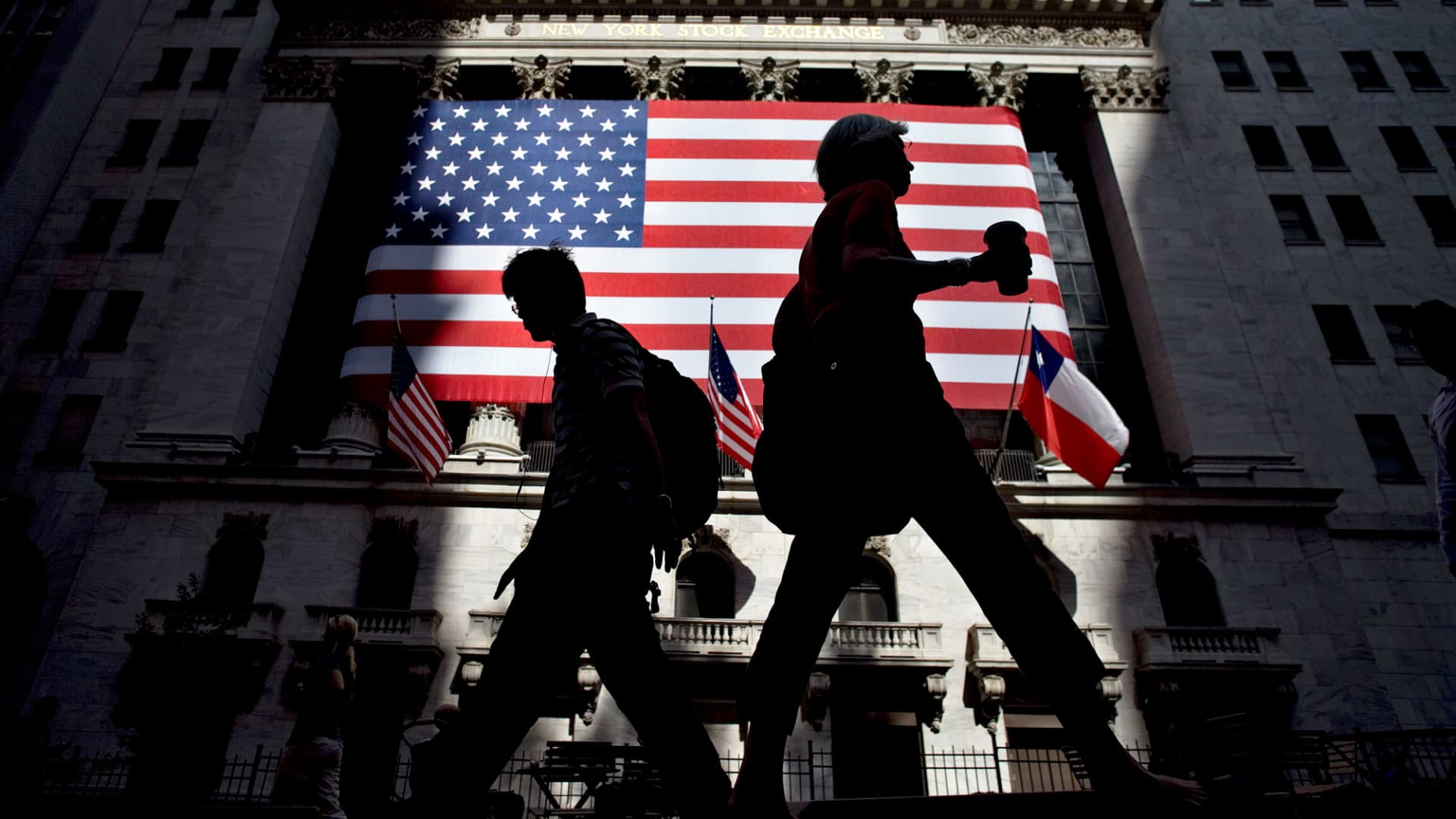

热门话题
7月11日以来,美股投资者遭遇了黑色星期三的冲击。纳指最大回撤达到9.5%,科技七姐妹联手跌没了1.9万亿美元,本轮回调主要受降息预期下的资金轮换和选情抑制风险偏好的影响,很多投资者猜测当前美股行情为衰退交易,美股是不是要见顶了?现在简单谈下我的看法。

首先,美国经济没有出现明显衰退迹象,具体体现在通胀数据与经济数据同步出现积极信号。虽然6月核心PCE没能降下来,但6月CPI数据和7月小非农的超预期回落已为降息补上了最后拼图,而美国“预估” 二季度GDP年化环比增速 2.8%不仅大超预期2%,而且好于前值1.4%。这正符合美国追求的经济健康和软着陆状态,当前只能说基本面放缓,但不至于衰退。其次,历史数据得知,美股见顶与降息没有必然的先后顺序:2000年Dot-com Bust时,标普500在2000年9月份见顶,2000年1月才开始降息;2007年8月首次降息几乎同时出现市场见顶情景;2019年降息之前大盘也是涨跌不一难以归为单边行情。
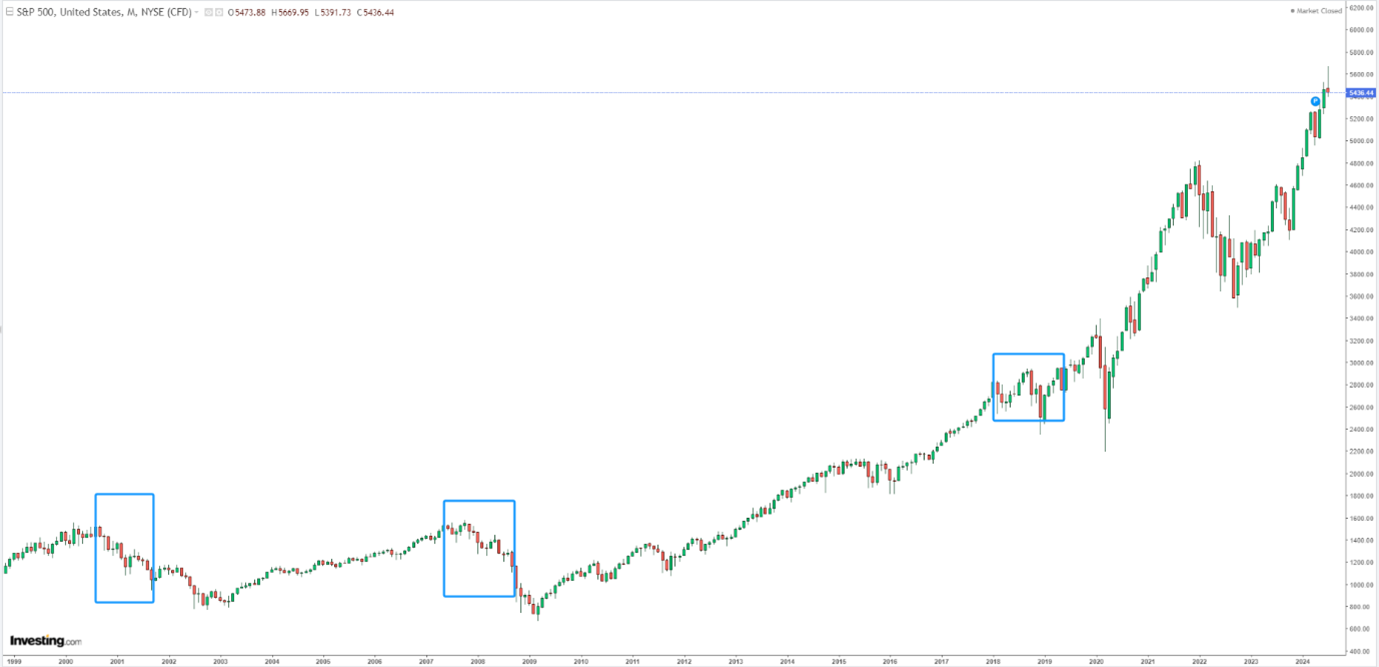
(Source: Investing.com)降息预期升温和美国选情打压下,资金确实出现了从科技巨头获利盘流向中小盘的轮动现象,但是我们认为本次标普500和纳指回调是正常的、健康的,也是市场通过挤出泡沫来自我调节。从S&P500季节性波动来看,8-9月份本身表现欠佳,单从选举年的季节性波动来看,Q1偏向于横盘整理,在Day210即7月左右标普走势低迷,而今年7月和往年又有所不同,因拜登推选和特朗普暗杀事件,且美联储利率决议会议开在月底无法为7月提供明确指引,因此本轮7月中旬开始的回调主要受选情主宰。但是从8月开始,市场逻辑将回归宏观,同时风险偏好更加趋近保守,并且,刚召开的FOMC会议如期维持汇率不变也为市场注入新的稳定性。
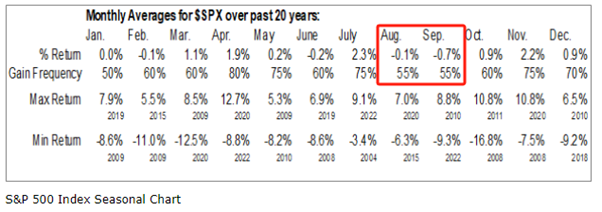
(Source: Equity Clock)
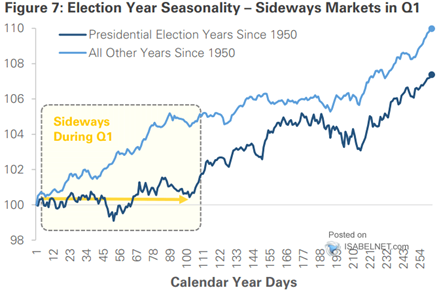
具体到美股后市走向,由于前期资金盘面过于拥挤,也就是当大多数投资者押注少数几个头部标的的情况下,市场情绪会变得较为激进敏感,当巨额CAPEX没有及时按照投资者预期兑现为ROE增量时,部分资金会转向降息预期下明确从分母获益的标的。我认为本次大盘走弱只是回调而非反转,在经济放缓的大环境下,我们强调“强者恒强”。降息兑现后,科技巨头们因其坚强盈利支撑更有能力将融资成本下行转变为盈利增长点,分母流动性改善有效传导至分子端资产盈利水平,而单纯受益于融资结构改善的中小盘股或许后续增长动能相对不足。美股科技巨头们在降息后市的短期趋势也可以从期权市场的数据窥得一二。因期权机制做市商或dealer需要保持Delta中性, 当市场做多看涨期权和做空看跌期权较多时,做市商会通过买入相应股票来对冲自己的头寸,在本身投资者看涨预期的基础上进一步加剧上涨动能,甚至有可能发现伽马挤压现象。从Net GEX(伽马曝险净值)来看,中长期来看GEX是判断市场情绪的一个辅助工具。以英伟达为例,伽马曝险净值在行权价格$115-$116之间翻转为正值,并且后续随着行权价格向上持续为正,一定程度上说明投资者对英伟达的偏爱和看好,那么此价格区间可做为看涨行情的参考支撑位。 Net GEX在行权价$130读数最大,可作为看涨行情中阻力位的参考,当然用期权参数来预估走向不是一概而论,必须结合技术及基本面等其他因素共同分析才会较为准确。
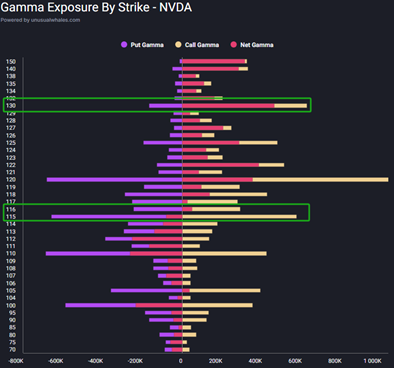
(Source: Unusualwhales)免责声明:GO arkets 分析师或外部发言人提供的信息基于其独立分析或个人经验。所表达的观点或交易风格仅代表其个人;并不代表 GO Markets 的观点或立场。联系方式:墨尔本 03 8658 0603悉尼 02 9188 0418中国地区(中文) 400 120 8537中国地区(英文) +248 4 671 903作者:
Christine Li | GO Markets 墨尔本中文部
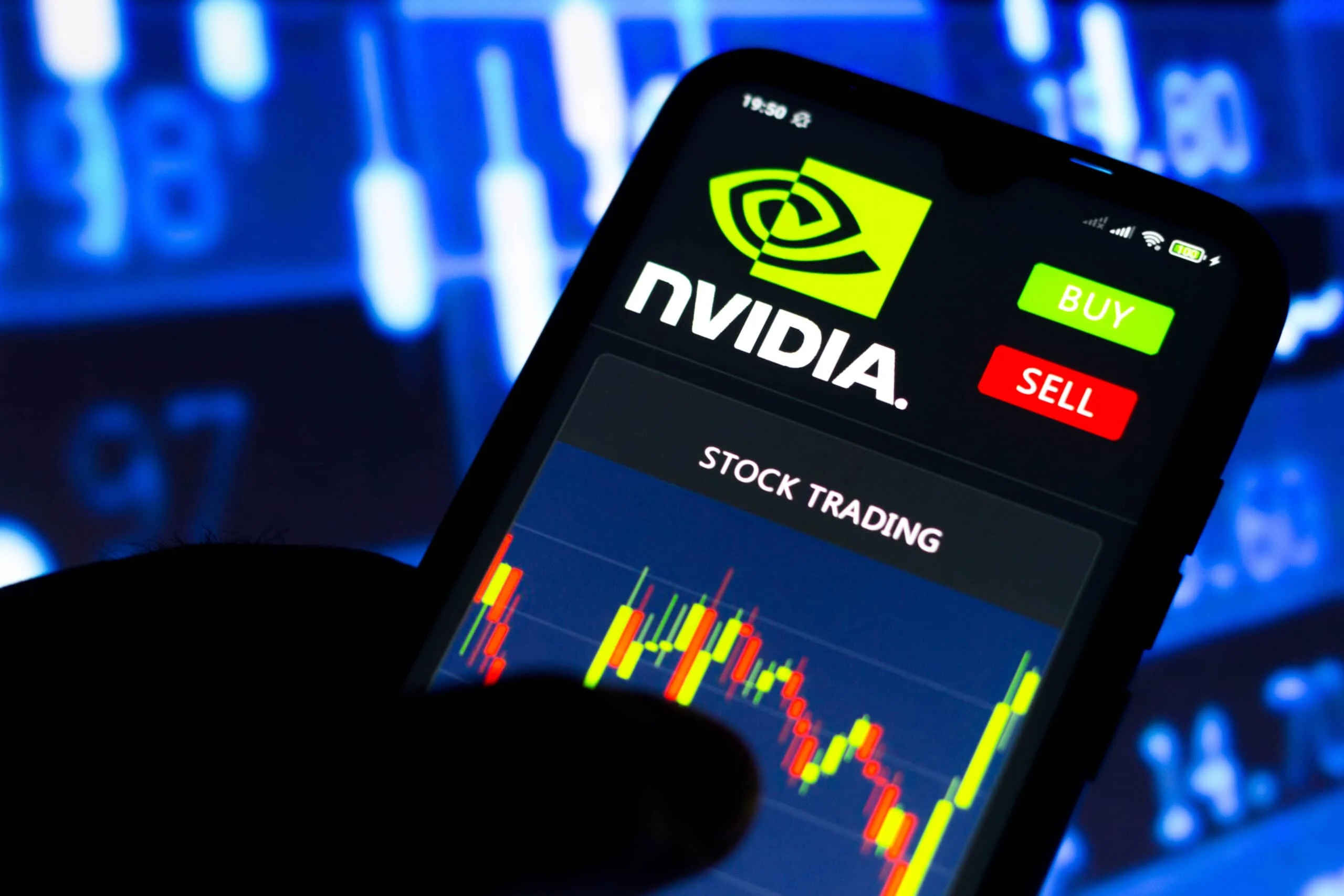

热门话题
NVDA是个好股票,因为代表了未来资金和科技的走向。但是,很多没上车的投资者都错过了,现在从高点140回落至104附近,下跌一个月后,是否是个好的抄底时机呢?就好像当年的特斯拉,错过了造富最佳时期,后面是否值得继续长期持有并买入?当时特斯拉的情况,和现在NVDA英伟达的情况类似,但只是资本市场价格走势的类似,背后的推动原因,本质上区别还是很大的。首先,特斯拉会被中国电动车卷到“没利润”,而NVDA在5-年的周期上,是不太需要担心被卷没的。
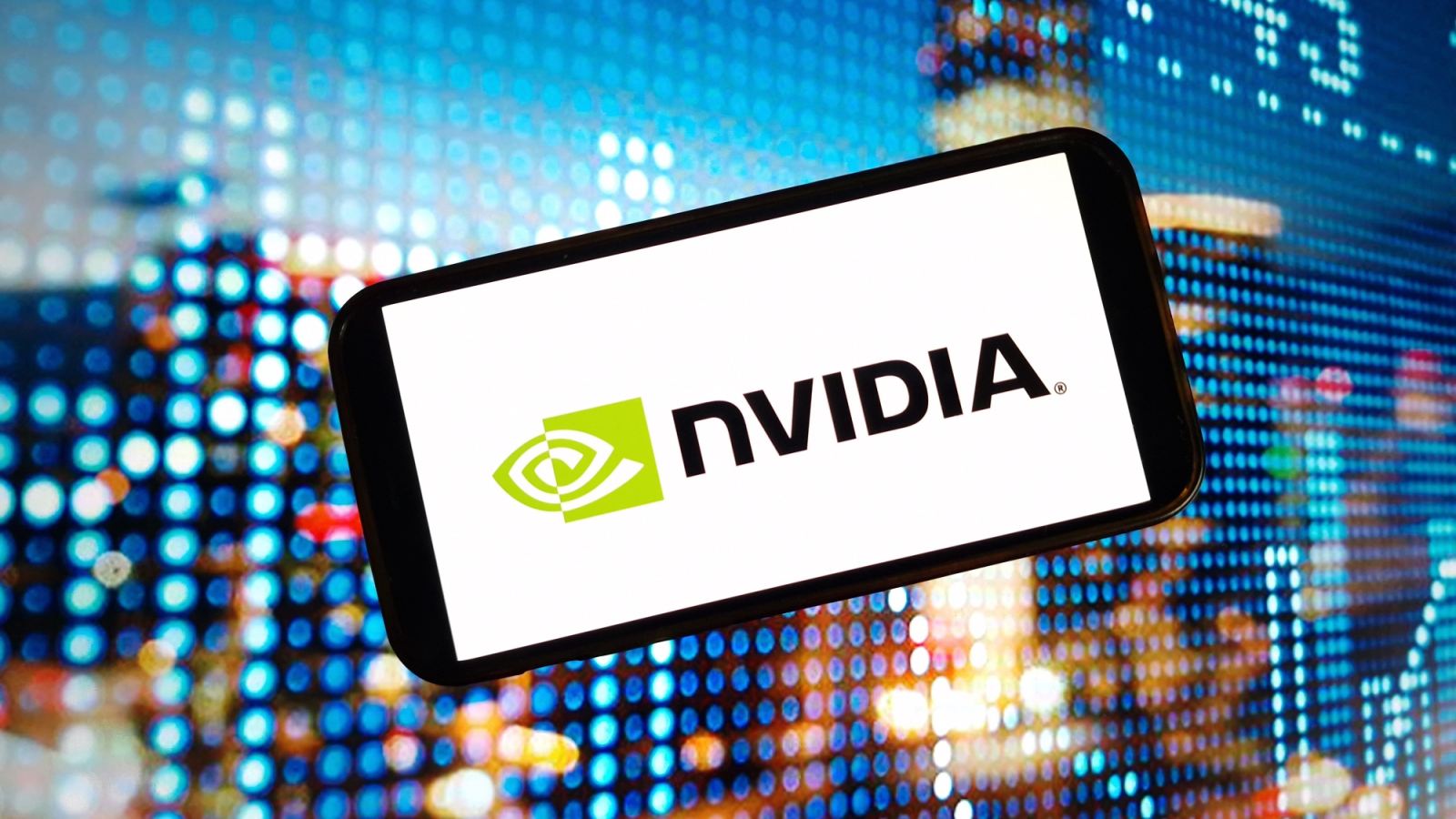
我们先看一下最近相应的几家AI或算力相关公司最新的财报信息,首先是三星,其第二季度芯片销售额为28.56万亿韩元,市场预测为27.49万亿韩元。三星第二季度净利润9.64万亿韩元,市场预测为7.97万亿韩元。总体上来说,三星作为一家韩国企业,在国际市场上的芯片领域,表现超出市场预期,也就意味着,高出20%的净利润也可能发生在其他AI相关产业上。曾经致富,一轮一轮的,靠着不同的生产力,从房地产,到互联网,再到数字货币,转到现在,靠的是AI。很多IT技术不错或者应用能力不错的个人,一个人就可以做一个软服务,比如靠AI做logo,做网站,每个月付费几美金,就可以永久想用享用这个AI服务,1万名用户,每月就是几万美金的净利润。英伟达是最夸张的一批企业,每天净赚12亿美金。英伟达在上半年显示的收入增长近三倍的同时,利润飙升至九倍,毛利率提升至 76.7%,数据中心拥有 83% 的营收占比。大多数科技公司采购英伟达的 GPU,主要用来做大模型的训练,大模型的推理场景已经占据英伟达数据中心 40% 的营收比例。到了2024年5月公布的财报,英伟达收入和毛利率,双双创出历史新高。二季度英伟达公司实现营收260.4亿美元,同比增长262.1%,净利润149亿美元,同比上升628%。

那么科技公司最近有没有遇到利空呢,肯定是有的。首先,微软云Azure出现故障,星巴克等大型公司都受到了影响。同时,微软Azure云增长放缓并略微不及预期,微软盘后一度跌超7%。另一边,英特尔计划裁员数千人以降低成本,为转型提供资金。AMD和英特尔的财报数据相对比较弱势 ,毕竟大厂的AI经费主要给了英伟达,所以英伟达未来有可能面临着来自其他公司的竞争。在内容上,美国参议院以压倒性多数通过了一项立法,让科技公司对有害内容负责(虽然我认为这一条可能针对的是X和Tiktok等不服管教的内容类互联网公司)。
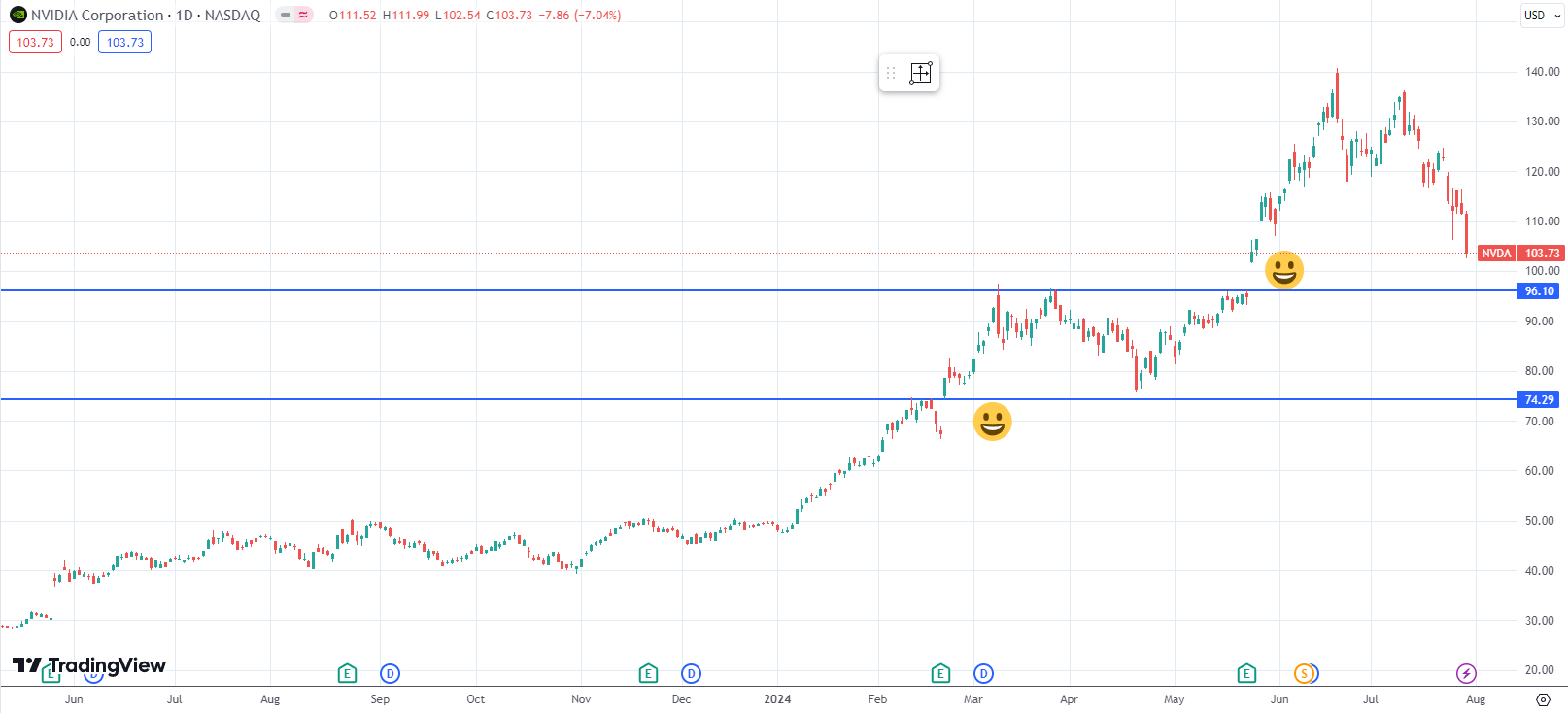
从图形上来看,英伟达在前期96-100美金有一个缺口,68-75美金有一个缺口。在股票市场中,补齐缺口的概率大于外汇市场,所以,比较稳妥的进场计划在96美金和75美金附近,大家近期可以关注。长期看,英伟达有着最强的迭代能力和团队人才优势,科技公司的壁垒远远高于一家餐厅或奶茶店,胡高于普通制造业。在高精尖领域,垄断优势会长期存在,所以,我认为英伟达的上涨,可能远远超过特斯拉的上涨周期。而目前随着美国科技股或热潮褪去,亦或是美国大选的不确定性和美联储态度的各种变化导致英伟达股价下跌,我认为都是相对短期的影响,所以,大家可以持续关注这家全人类级别的公司,跟随人类科技和生产力的进步一起获益。免责声明:GO arkets 分析师或外部发言人提供的信息基于其独立分析或个人经验。所表达的观点或交易风格仅代表其个人;并不代表 GO Markets 的观点或立场。
联系方式:
墨尔本 03 8658 0603
悉尼 02 9188 0418
中国地区(中文) 400 120 8537
中国地区(英文) +248 4 671 903
作者:
Jacky Wang | GO Markets 亚洲投研部主管

